Washington’s Warnings Revisited: Part 1
How the Farewell Address Foretold the Challenges of Modern America: Paragraphs 1 through 9
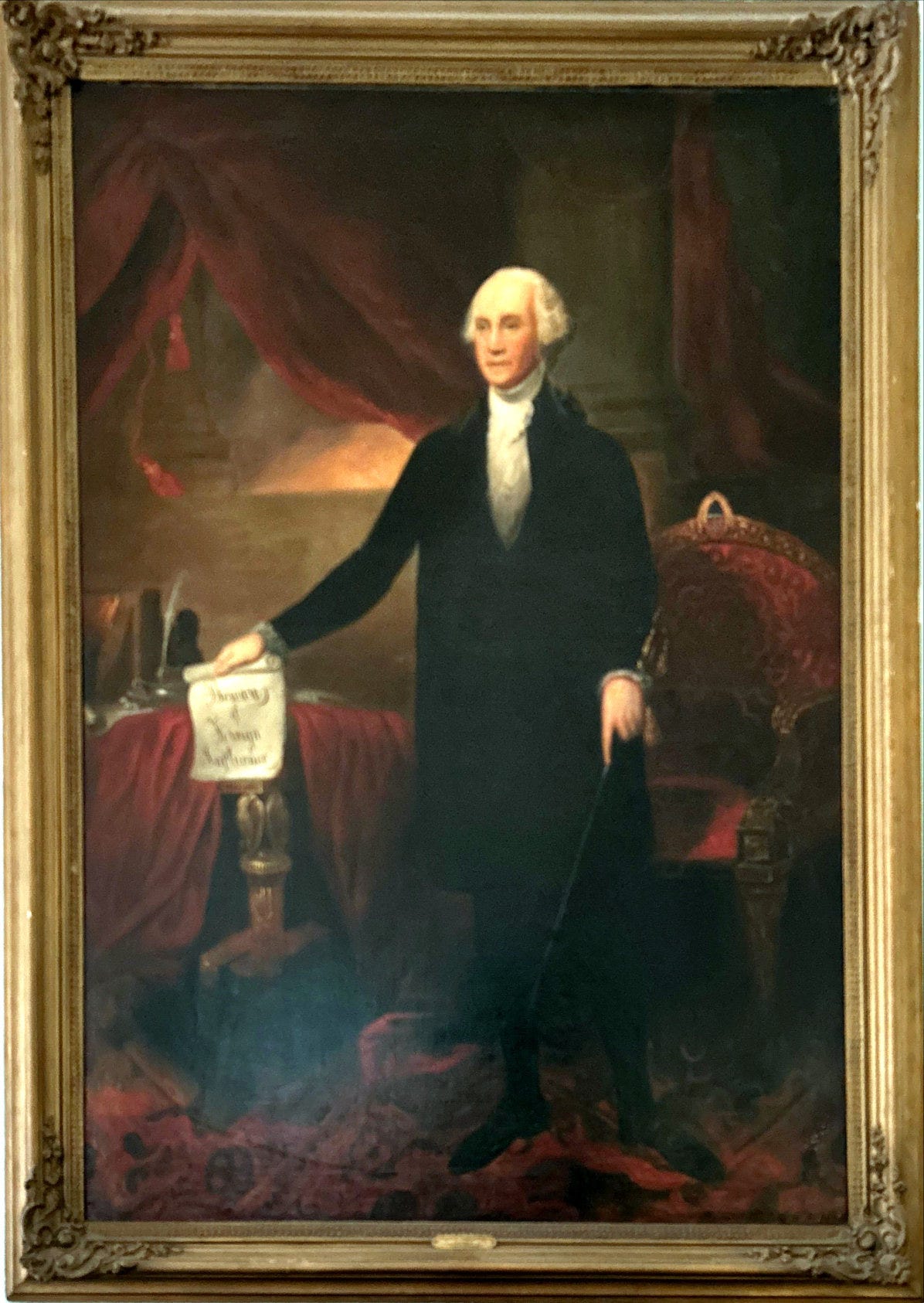
Citizens by birth or choice of a common country, that country has a right to concentrate your affections. The name of American, which belongs to you in your national capacity, must always exalt the just pride of patriotism more than any appellation derived from local discriminations. With slight shades of difference, you have the same religion, manners, habits, and political principles. You have in a common cause fought and triumphed together. The independence and liberty you possess are the work of joint councils and joint efforts, of common dangers, sufferings, and successes.
George Washinton, farewell address paragraph No. 1
Words 6,777 | Read Time 31 min | Enjoy
Foreword
I dedicate this extensive three-part book-length essay to my wonderful subscribers and followers, who inspire and fortify my moral incentive to continue.
Introduction
In George Washington’s Farewell Address of 1796, the first President of the United States offered a series of profound warnings and principles to guide the nation after he departed from public office. His advice, grounded in the ideals of unity, morality, and caution against the overreach of power, reflected his experience and vision for a stable republic. However, as we examine today’s putrid political and stinky social climate, Washington’s cautionary words appear uncannily relevant. Each of the 28 paragraphs of his address resonates with modern challenges—political divisiveness, foreign entanglements, and the erosion of norms. This essay analyzes Washington’s address, connecting each key point to the current state of affairs in the United States, where many of his warnings seem relevant and increasingly critical to the nation’s future, if not existence.
Table of Contents
On this post’s online PC-based browser version, the Substack Table of Contents feature is to the left edge of this window on your device’s screen. Click on the “ladder” bar to open the TOC for easy navigation.
George Washington Farewell Address, September 19, 1796: Part 1 (paragraphs 1 through 9)
Paragraph 1 - Citizens by birth or choice of a common country
Citizens by birth or choice of a common country, that country has a right to concentrate your affections. The name of American, which belongs to you in your national capacity, must always exalt the just pride of patriotism more than any appellation derived from local discriminations. With slight shades of difference, you have the same religion, manners, habits, and political principles. You have in a common cause fought and triumphed together. The independence and liberty you possess are the work of joint councils and joint efforts, of common dangers, sufferings, and successes.
Contemporary Rewrite
Whether you were born here or whether you came to this country and made it your home, your loyalty must be to the United States. The term "American" applied to you is the name given to a citizen of this country, and it should fill your heart with a profound sense of pride and love for your country, more significant than that which you have for the land of your birth. While there are differences, you have a set of beliefs, customs, and political principles in common. You have all united and have struggled to achieve something familiar. The autonomy you enjoy today is the fruit of cooperation-working out obstacles, crossing barriers, and sharing triumphs.
Today’s Reality
Today, whether by birth or by choice, citizens by birth or choice of a common country are being portrayed as xenophobic by our flawed collective want to be rulers. Our sense of unity has shifted in today’s America. The musky message promotes loyalty to a political party above all else, focusing solely on a collective type of shared identity and purpose. We are experiencing induced divisions along political, racial, gender, religious, and regional lines, emphasizing our differences in beliefs, backgrounds, and ideologies. Instead, we should view ourselves as Americans, united by shared values and goals. For instance, the rainbow flag has come to symbolize the USA more than its traditional colors. It is all about dizzy Disney’s Mickey Mouse mush called Diversity-Inclusion-Equity (DIE).
In today’s polarized society, sharing the same customs, habits, and political beliefs feels distant. Classical or traditional customs are projected as being racist, phobic, and potential terrorist threats. Thus, disagreements are no longer minor but have become profound rifts that affect our interactions. Our once-united cause is now a fragmented reality, with different groups rallying around varied, often opposing visions for the country's future. While DIE may tickle the ear, it is an instrument of a cultural Maoist-Marxist-Communist front aiming to destroy our common country.
Furthermore, Washington discusses the recognition associated with being called an “American,” but this identity is currently a source of debate. Some people express their “patriotism” by advocating for crummy collectivist change and progress, while others view it as preserving tradition and established values. Unfortunately, displaying the American flag can label individuals as “potential terrorists.” This divide can make it difficult to establish a common American identity.
Once, we celebrated our independence and freedom due to joint efforts. Now, disputes over their ideals sometimes overshadow that. The risks, hardships, and victories should unite us. Many communities and perspectives now hold dopey “diverse” opinions. The DIE is cast.
Washington’s vision of a united America contrasts with the demented and divided alt-reality of today. Yet, we of cogent minds may find a call to see these differences. It is to revive the shared purpose and effort that once defined us. Meanwhile, we are experiencing an unprecedented situation at the southern border. During the previous administration, we had the Remain in Mexico program. That ensured most individuals here illegally and caught would not stay in the U.S. Under the current administration, these illegal immigrants or undocumented visitor invaders get free stuff. They get accommodation galore. They enjoy free food, lodging, and transportation to destinations they choose within the U.S. Few attend their required asylum hearings. The waiting period currently stands at a staggering 934 days or more. Yet, as a citizen, getting a speeding ticket and “justice” occur instantly. We are the low-hanging fruit for the gross and gluttonist barbarians inside the gates.
Paragraph 2 - Immediate and particular interest in union
While, then, every part of our country thus feels an immediate and particular interest in union, all the parts combined can not fail to find in the united mass of means and efforts greater strength, greater resource, proportionably greater security from external danger, a less frequent interruption of their peace by foreign nations, and what is of inestimable value, they must derive from union an exemption from those broils and wars between themselves which so frequently afflict neighboring countries not tied together by the same governments, which their own rivalships alone would be sufficient to produce, but which opposite foreign alliances, attachments, and intrigues would stimulate and imbitter. Hence, likewise, they will avoid the necessity of those overgrown military establishments which, under any form of government, are inauspicious to liberty, and which are to be regarded as particularly hostile to republican liberty. In this sense it is that your union ought to be considered as a main prop of your liberty, and that the love of the one ought to endear to you the preservation of the other.
Contemporary Rewrite
Every region of our country has a vested interest in remaining united. When we unite, we all benefit from increased strength, more resources, greater security from external threats, and fewer disruptions to our peace from foreign nations. Importantly, unity protects us from internal conflicts and wars that often trouble neighboring countries without a shared government. Without unity, rivalries and conflicting foreign alliances could easily lead to discord and strife. By staying united, we also avoid the need for large military forces, which threaten freedom regardless of the type of government and are particularly dangerous to republican liberty. Therefore, consider your union essential to supporting your freedom, and let your commitment to one strengthen your dedication to preserving the other.
Today’s Reality
An immediate and particular interest in union once stood as the bedrock of our nation’s strength, promising shared resources, security, and internal peace. But today, that dream is a distant memory. We find ourselves in a country fractured by deep political and cultural fault lines. “Good” is under the auspices of left-wing progressive causes. Anything not bowing down to the god of progressive repression is considered “hard right,” with the muddy middle no longer. CNN and its surrogates never called the St. Floyd riots a left-wing thing.
With that as background, look around, and you’ll see a landscape where crime often goes unpunished while cogent virtue struggles for recognition. It’s a far cry from the harmonious whole our founders envisioned. Instead, we’ve become a patchwork of rival factions, our differences amplified by relentless partisanship and the echo chambers of modern media.
Remember when we thought unity would protect us from needing a massive military? Now, we maintain the world’s most far-flung armed forces, with bases scattered across the globe. It’s ironic. We’ve built up the very thing our forebears cautioned against, all in the name of “safeguarding our freedom.” The notion we are the world’s harbinger of democracy is nothing more than a gateway for the money masters to engage in more mental masturbation while raking in more fiat currency. This disgusting thread of alt-reality must come to a stop.
And freedom itself? It’s become a battlefield of competing definitions. Some correctly champion personal liberties, while others fight for communist-like collective rights and social-ist justice. These clashing viewpoints often lead to more conflict than cohesion. We get controlled with the phony notion of consensus to mask the enormous pile of crap fed to us in the media, education, and academia.
So, where does this leave us? The old idea that unity was America’s secret weapon feels like it belongs to another era—and it does! But that is precisely why we need to revisit it. We have a challenge: to find a way to bridge these chasms that divide us and rediscover some common ground in this fragmented landscape.
It won’t be easy. Rivalries run deep, and our shared identity as Americans is long gone. But if we can find a way to recommit to unity—not as a naive dream but as a hard-won reality—we might uncover the strength to preserve the freedoms we all hold dear, no matter how differently we define them.
Paragraph 3 - Respect for authority
… Respect for its authority, compliance with its laws, acquiescence in its measures, are duties enjoined by the fundamental maxims of true liberty. The basis of our political systems is the right of the people to make and to alter their constitutions of government. But the constitution which at any time exists till changed by an explicit and authentic act of the whole people is sacredly obligatory upon all. The very idea of the power and the right of the people to establish government presupposes the duty of every individual to obey the established government. (According to Washington, faithfulness to the Constitution is critically important; both citizens and government must follow it until changed by an amendment clearly consented to by the people.) All obstructions to the execution of the laws, all combinations and associations, under whatever plausible character, with the real design to direct, control, counteract, or awe the regular deliberation and action of the constituted authorities, are destructive of this fundamental principle and of fatal tendency. They serve to organize faction; to give it an artificial and extraordinary force; to put in the place of the delegated will of the nation the will of a party, often a small but artful and enterprising minority of the community, and, according to the alternate triumphs of different parties, to make the public administration the mirror of the ill-concerted and incongruous projects of faction rather than the organ of consistent and wholesome plans, digested by common counsels and modified by mutual interests. . . .
Contemporary Rewrite
Respecting authority, obeying laws, and accepting government actions are essential duties that uphold true liberty. The foundation of our political systems lies in the people’s right to create and change their constitutions. However, any existing constitution remains binding on everyone until the entire populace’s legitimate act changes it. The very concept of the people’s power to establish government implies that each individual must obey that government. Adherence to the Constitution is essential; citizens and the government must follow it until amended with the people’s explicit consent. Any efforts to obstruct the enforcement of laws or any groups that seek to direct, control, oppose, or intimidate the legitimate actions of government authorities undermine this fundamental principle and pose serious risks. Such actions foster division, granting undue influence to factions, often a small but strategic and ambitious minority, thereby replacing the nation’s will with that of a particular group. As different factions alternate in power, this dynamic turns public administration into a reflection of poorly conceived and conflicting agendas rather than a body guided by consistent and well-thought-out plans shaped by common decision-making and shared interests.
Today’s Reality
This paragraph about respect for authority highlights the stark contrast between adherence to laws and the current state of our society. Today, polarized perspectives and a growing distrust in institutions frequently challenge the principles of respecting government actions, obeying rules, and adhering to constitutional authority. The idea that citizens must follow the government until changes occur through legitimate processes seems increasingly distant when many feel disenfranchised or opposed to the actions of those in power.
Public discourse often revolves around questioning the legitimacy of government actions and challenging the authority of elected officials. While healthy skepticism and civic engagement are vital, the erosion of common respect for lawful governance has led to a situation where actions and decisions get contested, sometimes in ways that disrupt social order and governance. Protests, civil disobedience, and outright defiance of laws can be seen as expressions of deeply held beliefs. But with fanfare, rancid riots by leftists get touted as “firey but mostly peaceful protests.”
Meanwhile, people, including elderly folk, who protest human reduction factories that sell used parts get stomped on with the full force of the federal government under the guize of the FACE Act. Or, for example, how the FBI SAWT team shows up at home to terrorize an entire family for being “pro-life.” That illustrates a broader disconnection from the idea that governance should be respected, even when it disagrees with personal views. To add insult to injury, the U.S. Army at Fort Liberty has trained around 10,000 American soldiers over the past seven years to classify pro-life organizations as terrorist groups. And what happens when the New World Order gets complete control? Will these mind-programmed troops be used to round up us cogent folk? Or worse?
Moreover, the concept of unity under a shared constitution dies off as differing interpretations of constitutional principles have led to sharp divisions. The increasing polarization has fostered an environment where political, ideological, or economic factions compete to impose their views, sometimes prioritizing their agendas over the common good. Remember, it is now the common-ist good with asinine ANTIFA troopers ready to defend the drag queens. That possible scenario has made achieving the cohesive and stable governance envisioned by Washington even more challenging. The government has become entangled in competing interests rather than driven by a self-disciplined vision of public welfare. But of course, we supposedly have the foolish notion of environmental-social-government to fix that problem.
Washington’s warning about the dangers of factions rings particularly true today, where the influence of small but vocal groups such as Burn Loot Murder (BLM) sway policy and direction, often at the expense of a broader, more inclusive consensus. The alternation of power between opposing factions has resulted in a lack of consistency in public administration, with policies shifting dramatically from one administration to the next, reflecting partisan priorities rather than a steady and thoughtful response to the nation’s needs.
Ultimately, this reflection serves as a reminder of the importance of balancing the right to challenge authority with respecting the structures that barely now hold our republic together. It calls for a renewed commitment to lawful governance and a shared respect for the processes that allow us to make changes when needed. As cogent-minded people, we can hope to reduce division by strengthening our dedication to these principles. Despite the rumors of a “civil war” between ideologies touted by the progressive voices, perhaps we can foster a more united and stable society, true to the ideals of liberty and collective responsibility.
Paragraph 4 - Obstructions to the execution of the laws
All obstructions to the execution of the laws, all combinations and associations, under whatever plausible character, with the real design to direct, control, counteract, or awe the regular deliberation and action of the constituted authorities, are destructive of this fundamental principle and of fatal tendency. They serve to organize faction; to give it an artificial and extraordinary force; to put in the place of the delegated will of the nation the will of a party, often a small but artful and enterprising minority of the community, and, according to the alternate triumphs of different parties, to make the public administration the mirror of the ill-concerted and incongruous projects of faction rather than the organ of consistent and wholesome plans, digested by common counsels and modified by mutual interests. . . .
Contemporary Rewrite
Any attempts to obstruct the enforcement of laws or any groups and organizations—no matter how legitimate they may seem—that aim to control, influence, or intimidate the normal functioning of government are harmful to the core principles of our system and pose serious risks. These actions help to strengthen factions, giving them an undue and unnatural influence, and replace the will of the nation with the will of a particular group—often a small, strategic, and ambitious minority. As different parties take turns gaining power, this dynamic can turn government into a reflection of poorly planned and conflicting agendas driven by factions rather than a steady and well-thought-out body guided by collective decision-making and shared interests.
Today’s Reality
The warnings about “obstructions to the execution of the laws” take us back to the future. It is a clarion call that is more relevant than ever. Today, we see a political landscape where obstruction and partisan agendas frequently dominate, often to the detriment of effective governance. The principle that laws should be respected and enforced, regardless of which party is in power, seems increasingly challenged. A culture of collective opposition prioritizes political wins over the good. Both sides have zero attraction to the Constitution.
Political parties, special interest groups, and influential media outlets have amplified divisions in modern times. It often results in government actions swayed by a narrow set of interests rather than reflecting the broader will of the people. This phenomenon undermines the idea of a unified national interest. It leads to inconsistent and erratic policy decisions as different groups push their agendas whenever they gain power. Instead of a government that serves as a steady guide shaped by shared interests and collaborative planning, we have a Leviathan that covers a cracked foundation. That being a fragmented government at all levels, reflecting various factions’ competing and projecting conflicting goals.
This dynamic is visible in the increasing polarization of American politics, where compromise and mutual understanding have become rare. Legislative gridlock and executive orders swing wildly from one administration to the next. Judicial battles over the interpretation of laws are all symptoms of a system where factional interests overshadow the commitment to stable, consistent governance. As a result, the nation’s governance can often appear more as a battleground for partisan battles than as a body committed to thoughtfully addressing the needs of all citizens.
Furthermore, the ability of small but vocal minorities like demented drag queens to sway national policy through lobbying, social media influence, or other means has grown substantially. That can create a disconnect between what is enacted by those in power and what is desired by the broader public. The warning in the text against replacing the will of the nation with the will of a faction feels particularly pertinent as we navigate these challenges. With vomit-spewing entities like ANTIFA given the kid glove treatment, it is high time to highlight the importance of unity, shared purpose, and respect for lawful governance.
In essence, while the text emphasizes the dangers of allowing factions to disrupt the regular functioning of government, today, we see these dynamics playing out on a grand scale. The challenge lies in finding ways to reinforce the principles of republican form of decision-making and shared interests, ensuring that government remains a true reflection of the nation’s will rather than a tool for advancing the agendas of a few.
Paragraph 5 - Cunning, ambitious, and unprincipled men
However combinations or associations of the above description may now and then answer popular ends, they are likely in the course of time and things to become potent engines by which cunning, ambitious, and unprincipled men will be enabled to subvert the power of the people, and to usurp for themselves the reins of government, destroying afterwards the very engines which have lifted them to unjust dominion…Towards the preservation of your government, and the permanency of your present happy state, it is requisite, not only that you steadily [denounce] irregular oppositions to [the] acknowledged authority [of the Constitution], but also that you resist with care the spirit of innovation upon its principles, however specious the pretexts. One method of assault may be to effect, in the forms of the Constitution, [amendments] which will impair the energy of the system [and] undermine what cannot be directly overthrown…. Liberty [will be found in a government with] powers properly distributed and adjusted. . . .
Contemporary Rewrite
While groups or alliances like those described might occasionally achieve popular goals, over time, they can become powerful tools for cunning, ambitious, and unprincipled individuals to undermine the power of the people and seize control of the government for themselves. Once in power, these individuals often dismantle the structures that helped them rise to unjust dominance. Remember to preserve your government and maintain your current well-being. Thus, it is crucial not only to oppose unlawful challenges to the Constitution’s recognized authority firmly but also to carefully guard against changes to its principles, no matter how appealing they seem. One tactic might involve altering the Constitution to weaken the system’s effectiveness and slowly erode what cannot be overthrown outright. True liberty is found in a government with properly distributed and balanced powers.
Today’s Reality
The cunning, ambitious, unprincipled men, women, and “others” among us highlight how much we have diverged from its cautionary wisdom in today’s political climate. Individuals and groups often leverage popular discontent or specific agendas to gain power. Like the doctors who relish making youngsters eunuchs with genital butchery, they prioritize their interests at the expense of the broader natural law that lifted them to their positions. Washington’s foresight in warning against manipulative leaders’ dismantling of the structures that enabled their rise is increasingly evident. The pogroms that undermine normalcy and weaken institutional checks and balances will coalesce to consolidate power in ways that jeopardize legitimate authority and safety.
In today’s lousy landscape, the allure of quick fixes and appealing but superficial changes to foundational governance principles has become more common. Indeed, the quick fix is the addiction to fiat currency to fulfill the dopey desires of the crummy collective members and the nasty neocons. This unlimited money fuels political factions that frequently propose constitutional amendments or reforms that, while appearing beneficial on the surface, could subtly erode the essential balance of powers that protects liberty. The increasing polarization and the tendency of some leaders to prioritize partisan gains over constitutional integrity reflect the dangers outlined by Washington, where ambition and cunning can overtake the genuine pursuit of the public good.
Moreover, Washington’s emphasis on resisting unlawful challenges to constitutional authority and guarding against reckless innovations is a call to value stability and respect for the established governance rules. In contrast, today’s political environment often features a push to alter foundational principles to suit the needs of the moment or the desires of a particular faction, risking the weakening of the very system that ensures republic governance. The frequent erosion of norms and the questioning of long-standing institutional roles demonstrate a drift from the values of caution, balance, and respect for the enduring framework that underpins our liberty.
As we navigate an era of rapid change and heightened partisanship, Washington reminds us of the importance of maintaining a vigilant defense of constitutional principles. That includes ensuring any changes are approached with the gravity and foresight necessary to safeguard the system’s integrity. His words remind us that true liberty is not found in constant upheaval or unchecked ambition. The precepts of checks and balances have fallen way to bogus bread and circuses. Still, in a government where power is carefully balanced, and the rule of law prevails, the good people will remain the nation’s guiding force.
Paragraph 6 - Constant danger of excess
There is an opinion that parties in free countries are useful checks upon the administration of the government, and serve to keep alive the spirit of liberty. This within certain limits is probably true; and in governments of a monarchical cast patriotism may look with indulgence, if not with favor, upon the spirit of party. But in those of the popular character, in governments purely elective, it is a spirit not to be encouraged. From their natural tendency it is certain there will always be enough of that spirit for every salutary purpose; and there being constant danger of excess, the effort ought to be by force of public opinion to mitigate and assuage it. A fire not to be quenched, it demands a uniform vigilance to prevent its bursting into a flame, lest, instead of warming, it should consume.
Contemporary Rewrite
Some believe that political parties in free countries act as useful checks on government and help keep the spirit of liberty alive. To some extent, this is likely true, and in monarchies, patriotism might tolerate or even favor the presence of political parties. However, in republican forms of government that rely on elections, the spirit of party politics should not be encouraged. Given their nature, there will always be enough of this spirit to serve any beneficial purpose, and since there’s a constant risk of it going too far, public opinion should work to moderate and control it. Like an unquenchable fire, it requires constant vigilance to prevent it from flaring up, as it has the potential to warm and destroy.
Today’s Reality
Reflecting on the constant danger of excess espouses a stark contrast with the current state of politics. While the idea that political parties serve as checks on government and maintain liberty has a smidgen of relevancy, the warning against encouraging excessive partisanship in the republican form of government has largely been ignored. Instead of acting as balanced forces that ensure accountability and represent diverse viewpoints, political parties are sources of deep division, prioritizing party interests over the common good. With the crummy education system, it is clear why we have a common-ist good as a driver, with half of the population being Pavlovian puppets.
Today, partisanship frequently overshadows public discourse, driving a wedge between citizens and fostering an environment where compromise and cooperation are rare. Rather than moderating party spirit, public opinion often amplifies it, as media and social platforms cater to increasingly polarized views, fueling division rather than unity. The intended vigilance to keep party spirit in check has been replaced by a cycle of constant confrontation, where the goal is not just to check the opposing side but to dominate and discredit it entirely.
Washington’s metaphor of partisanship as an unquenchable fire is particularly relevant now; instead of serving to warm the political landscape with constructive debate, this fire often threatens to consume, leading to gridlock, mistrust in institutions, and an erosion of republican norms. That‘s right, Virginia, USA, was founded as a republic, but we have degraded into a fiat dopey democracy. The relentless push of partisan agendas has overshadowed the spirit of collaboration and the shared pursuit of common goals.
In many ways, our current political environment has let partisanship evolve from a potentially useful check on government power into a destructive force that impedes effective governance and undermines the unity and stability crucial for a functioning republic. The challenge is to find ways to restore the true balance. Anything giant the crummy collective is now touted as “hard right.” The lousy uber-leftist SPLC sets the agenda. Thus, it is high time that political parties serve as instruments of the citizen’s will rather than engines of division.
Paragraph 7 - Habits of thinking
It is important, likewise, that the habits of thinking in a free country should inspire caution in those intrusted with its administration to confine themselves within their respective constitutional spheres, avoiding in the exercise of the powers of one department to encroach upon another. The spirit of encroachment tends to consolidate the powers of all the departments in one, and thus to create, whatever the form of government, a real despotism. A just estimate of that love of power and proneness to abuse it which predominates in the human heart is sufficient to satisfy us of the truth of this position. The necessity of reciprocal checks in the exercise of political power, by dividing and distributing it into different depositories, and constituting each the guardian of the public weal against invasions by the others, has been evinced by experiments ancient and modern, some of them in our country and under our own eyes.
Contemporary Rewrite
In a free country, those in government must be mindful of staying within their constitutional limits and not overstepping into the roles of other branches. When one branch tries to take on powers that belong to another, it risks merging all governmental powers into one, leading to a form of tyranny, regardless of the government’s official structure. Recognizing the human tendency to seek and misuse power underscores the truth of this risk. Past and present history, including examples from our own country, shows the importance of checks and balances. By distributing power across different branches and having each branch protect the public good from the others’ overreach, we can maintain a balanced and fair system of governance.
Today’s Reality
Today, the idea of habits of thinking to define boundaries and respect for the separation of powers has become increasingly blurred. There is a growing perception that the branches of government often encroach on one another’s responsibilities, leading to power struggles that erode the checks and balances vital to a healthy republic. For example, executive actions sometimes bypass legislative processes, while courts can be seen as overstepping their role by shaping policy. This shift away from strict adherence to constitutional roles has fostered a climate where the consolidation of power in one branch appears more plausible, threatening the balance that protects against despotism.
Moreover, pursuing power and partisan gains often overshadows the truly collective good, further distorting the intended checks on authority. The respect for mutual oversight that once underpinned our political system is frequently undermined by polarization, making it harder to achieve the balanced governance envisioned in the original text. Instead of serving as guardians of the public interest, branches can become partisan ambition tools, reflecting the human inclinations towards power and control that the text warns against. For example, Chuck Schumer can threaten the Supreme Court with impunity. Meanwile, those who belong to the cult of abortion can make a spectacle of themselves in every conceivable gross projection imaginable and are favored with the “respect” of the media and government. The removal of unborn babies gets the same consideration as cancer cells, and we dare call it women’s health care or reproductive rights. Moreover, some of the feckless faces of that cult crowd have trouble defining a woman.
In today’s political landscape, reinforcing the boundaries between governmental branches and reviving a commitment to their constitutional limits is essential. Without this vigilance, the dangers of power consolidation and abuse will grow, moving us further from the balanced, fair system that is the foundation of true liberty.
Paragraph 8 - Distribution or modification of the constitutional powers
To preserve them must be as necessary as to institute them. If in the opinion of the people the distribution or modification of the constitutional powers be in any particular wrong, let it be corrected by an amendment in the way which the Constitution designates. But let there be no change by usurpation; for though this in one instance may be the instrument of good, it is the customary weapon by which free governments are destroyed. The precedent must always greatly overbalance in permanent evil any partial or transient benefit which the use can at any time yield.
Contemporary Rewrite
Maintaining the constitutional framework is just as crucial as creating it. If the people believe that the distribution or use of constitutional powers is flawed, the appropriate course is to correct it through amendments as outlined in the Constitution. However, changes should never be made through unauthorized means because even if such actions might achieve some immediate good, they are often the tools that destroy free governments. The long-term negative consequences of setting such a precedent will far outweigh any short-term benefits it might provide.
Today’s Reality
Today, the distribution or modification of the constitutional powers, as seen in the light of today’s PsyOps, is a stark reminder of the trip-wire danger we face today. We frequently see efforts to bypass constitutional processes through executive orders, judicial activism, or legislative maneuvers that stretch beyond intended limits. Rather than adhering strictly to the amendment process, there is often a rush to achieve immediate results, sometimes at the cost of the foundational rules designed to safeguard our freedoms. This impatience and disregard for a proper procedure can erode the integrity of our system over time, as these actions set precedents that future leaders might exploit, potentially leading to abuses of power. In many cases, there is a tendency to prioritize short-term gains or partisan victories over the long-term health of our constitutional framework. The foresight to understand the profound implications of bypassing established procedures is often overshadowed by immediate political pressures, leading us further from the balanced governance envisioned by the framers. Ultimately, this shift reflects a broader erosion of trust in the process and underestimates the importance of preserving the system’s integrity, even when faced with pressing challenges.
Currently, the push for a convention of the states may seem like a good thing. However, that can be a slippery slope if such an effort fails to nullify the harmful amendments. The best fix would be to follow the Constitution, but the lure of fiat money is out of control: thirty-five trillion and counting. Does that $104,859 per person include the undocumented visitors?
Paragraph 9 - Religion and morality are indispensable supports
Of all the dispositions and habits which lead to political prosperity, religion and morality are indispensable supports. In vain would that man claim the tribute of patriotism who should labor to subvert these great pillars of human happiness--these firmest props of the duties of men and citizens. The mere politician, equally with the pious man, ought to respect and to cherish them. A volume could not trace all their connections with private and public felicity. Let it simply be asked, Where is the security for property, for reputation, for life, if the sense of religious obligation desert the oaths which are the instruments of investigation in courts of justice? And let us with caution indulge the supposition that morality can be maintained without religion. Whatever may be conceded to the influence of refined education on minds of peculiar structure, reason and experience both forbid us to expect that national morality can prevail in exclusion of religious principle.
Contemporary Rewrite
Religion and morality are essential foundations of all the attitudes and behaviors contributing to a nation’s success. Anyone who seeks to undermine these core elements of human happiness cannot honestly claim to be a patriot. Both politicians and individuals of faith should respect and uphold these values. The relationship between religion, morality, and public and private well-being is deeply intertwined, affecting everything from protecting property to reputation and life. What security would remain if the sense of religious duty were removed from the legal oaths that uphold justice? We should be cautious in assuming that morality can stand on its own without the support of religion. While some may argue that a refined education could sustain ethical behavior in specific individuals, both reason and experience show us that a society’s moral fabric is unlikely to endure without a foundation in religious principles.
Today’s Reality
Now we know why the projecting progressives, the overarching left, is the most significant harbinger of hate. They loathe the precept that religion and morality are indispensable supports. That is a breach in their worshiped wall of separation. Washington would likely perceive the current state of affairs with deep concern, seeing it as a significant departure from the values he believed were essential to national stability and prosperity.
He emphasized that religion and morality are not merely personal choices but foundational supports of political and social order. Today, however, we live in a society where the separation of morality from its religious roots has become more pronounced, and the role of cogent religion in public life has been increasingly minimized. Washington would likely caution that such a shift endangers the very fabric of civic life. Today, we live under the auspices of a new religion unshackled from the constraints of the “wall of separation” with a get-out-of-jail card. Behold, the one world religion of the nasty new word disorder, the secular New Age of Aquarius.
Our founding father would argue that weakening the connection between religion and morality risks eroding the bonds of duty and trust essential for justice and societal cohesion. Without the shared sense of accountability that religious principles provide, the integrity of legal oaths, respect for laws, and an overall sense of civic responsibility among citizens may diminish. This shift leaves fundamental aspects of society—such as property security, reputation, and even life—more vulnerable than in the past.
Washington would see the current climate, where the moral fabric of society is often expected to endure without foundation in religious principles, as a precarious situation. He would likely view this as a dangerous experiment that overlooks the lessons of reason and experience. The idea that a refined education alone could sustain ethical behavior might seem inadequate to him, as he believed national morality could not prevail without religious principles. Today, in the crummy classroom, it is rainbow flags, stinky socialism, and genital mutilation without parental consent.
In his eyes, true patriotism would inherently involve upholding the moral and religious principles underpinning personal conduct and public policy. From Washington’s perspective, our current trajectory—where the pillars of religion and morality are often sidelined—would threaten the nation’s enduring prosperity and unity. He would warn that by moving away from these foundational supports with things like the lice-infected rainbow flag, we risk losing the elements that secure our freedoms and bind us together as a people.
Stay Tuned
But wait, there is more, my cogent-minded friends, much more! Stay tuned for Washington’s Warnings Revisited: Part 2, paragraphs 10 through 18.
Anti-Woke Closing for Part 1
Play it often; play it loud. Irriate the Willfully Overlooking Known Evil (WOKE) ecosystem. 📕
I warmly encourage you to consider becoming a paid subscriber if you have the means. Tips are appreciated, too. Regardless of your choice, your support is deeply appreciated. From the bottom of my heart, thank you for your invaluable support!





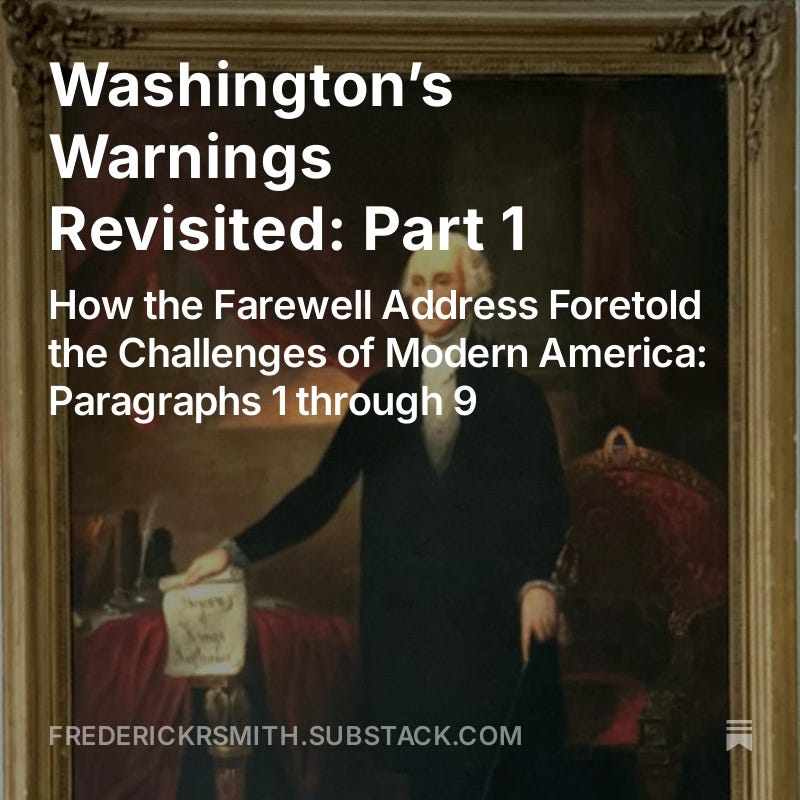
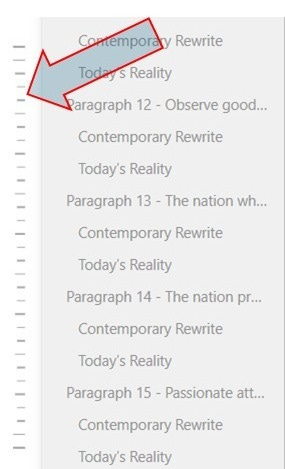
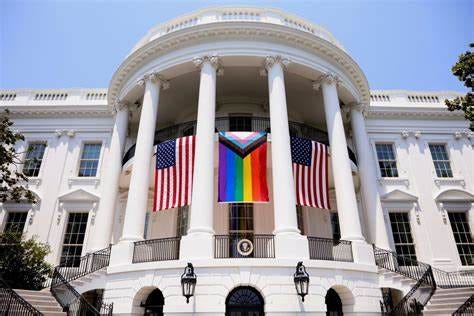
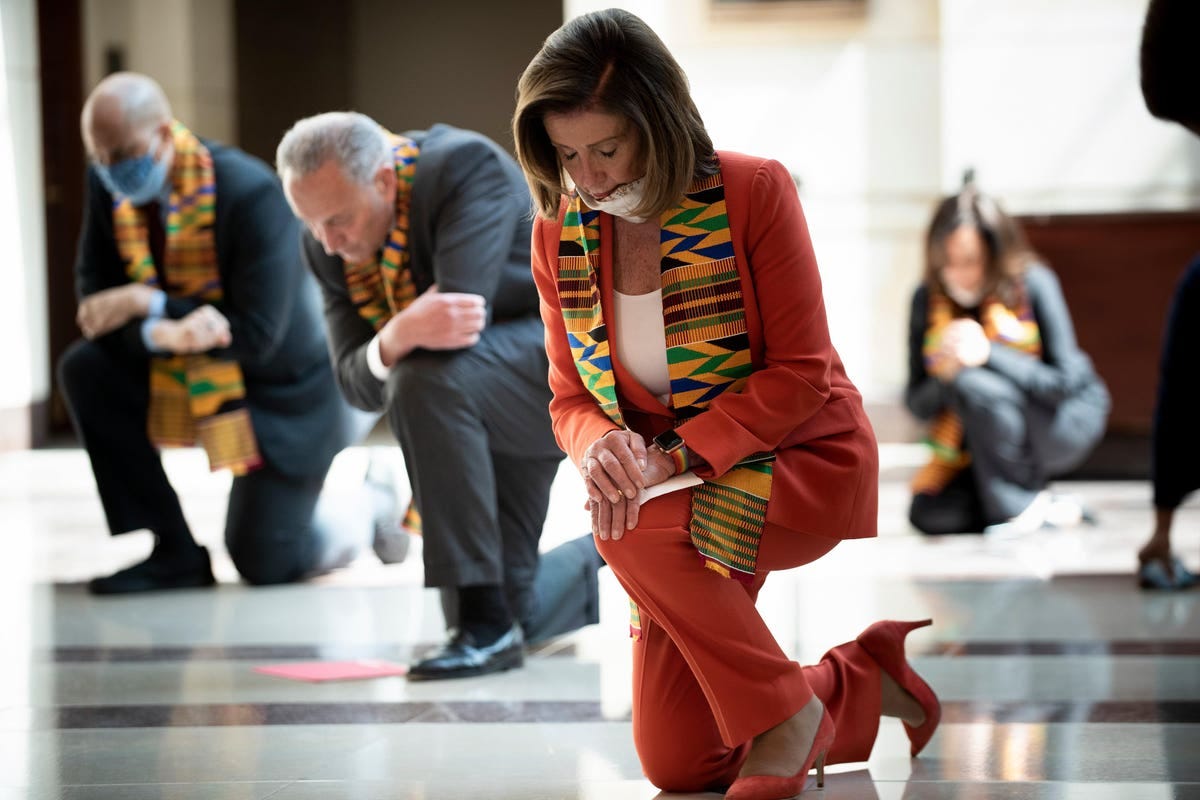
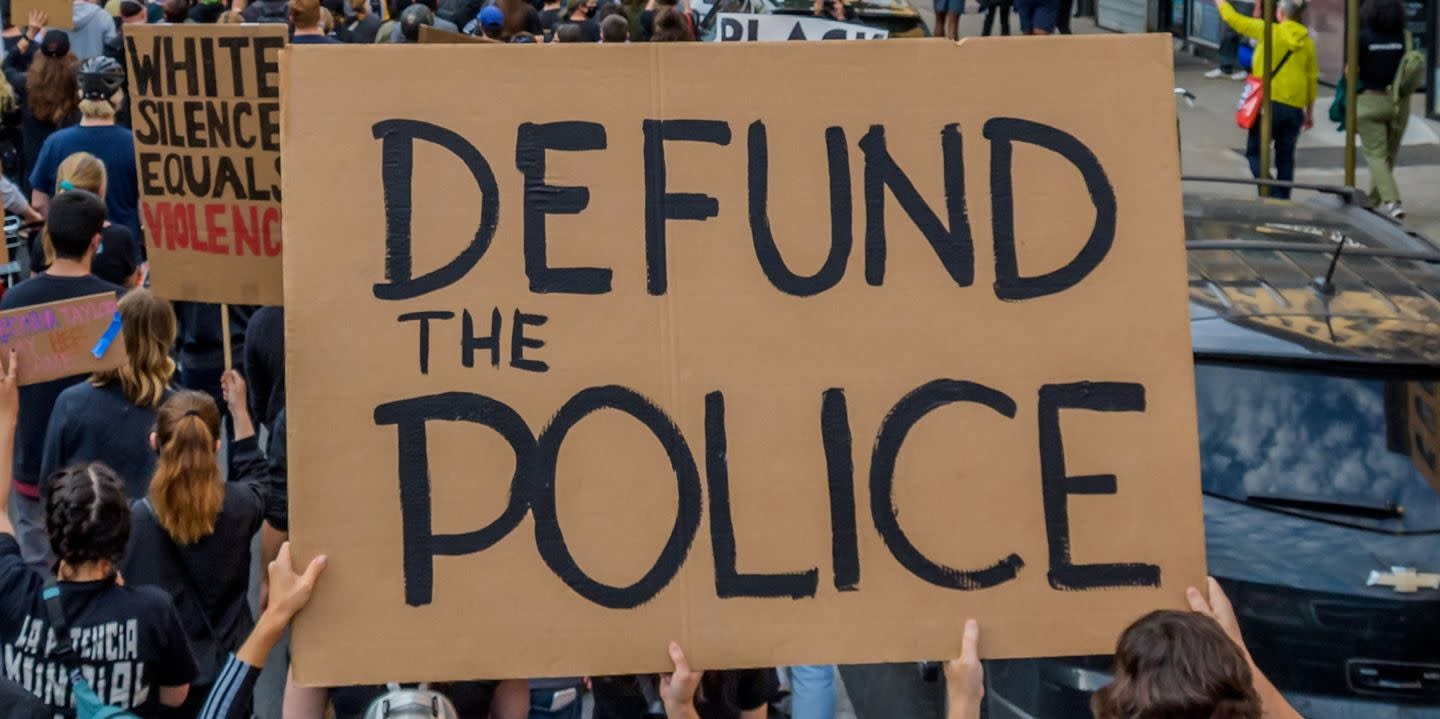

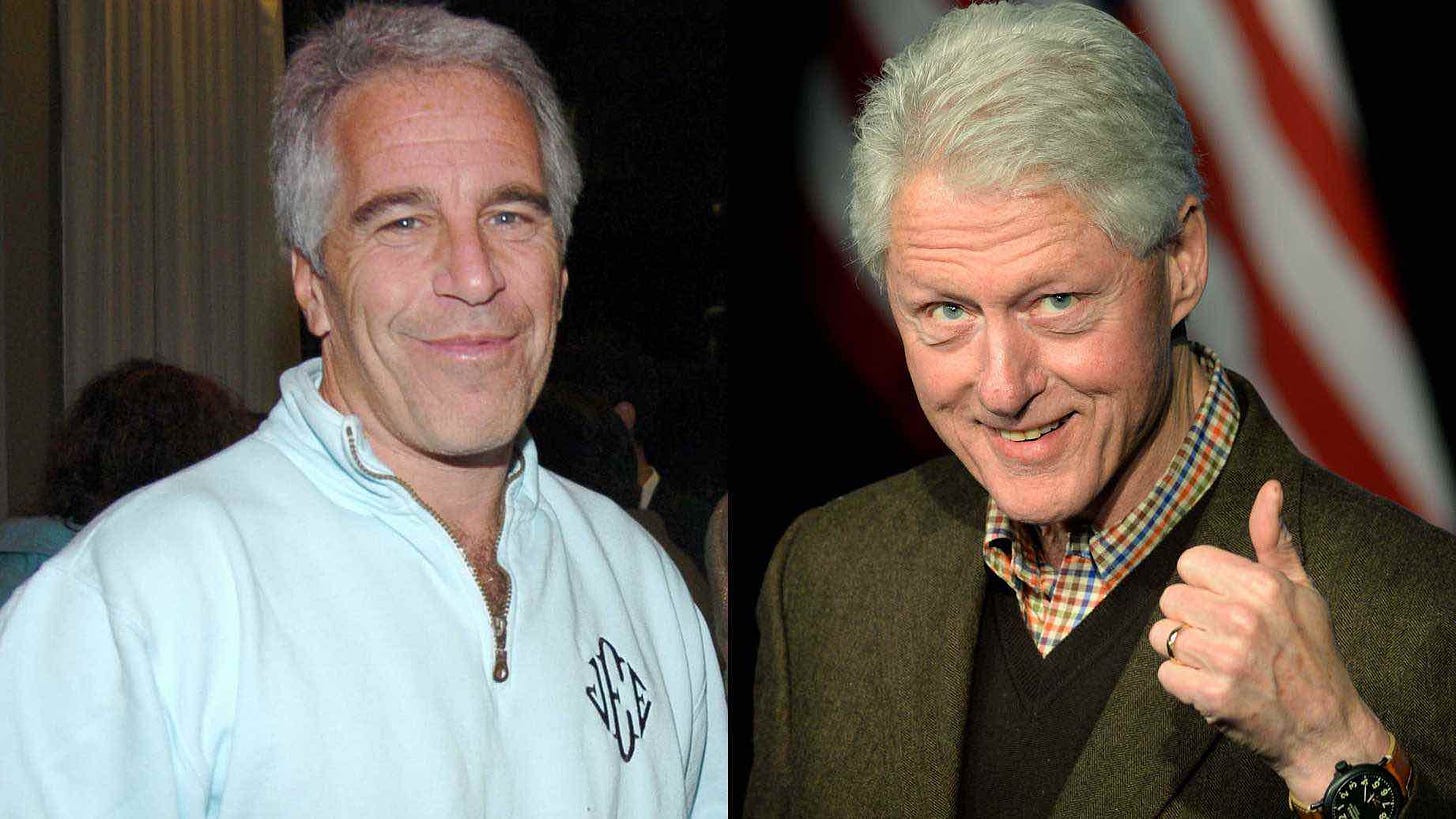
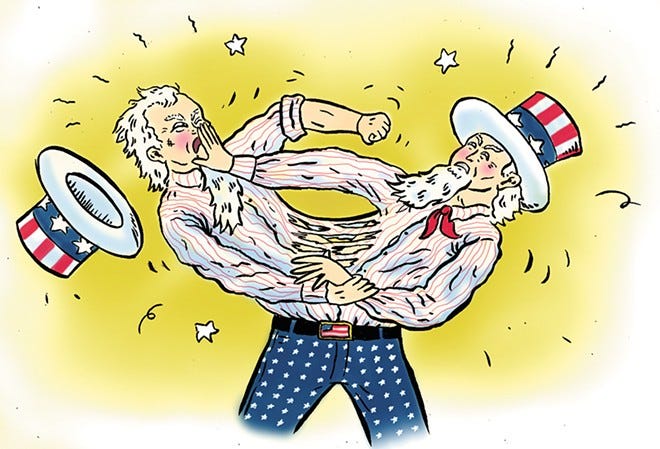
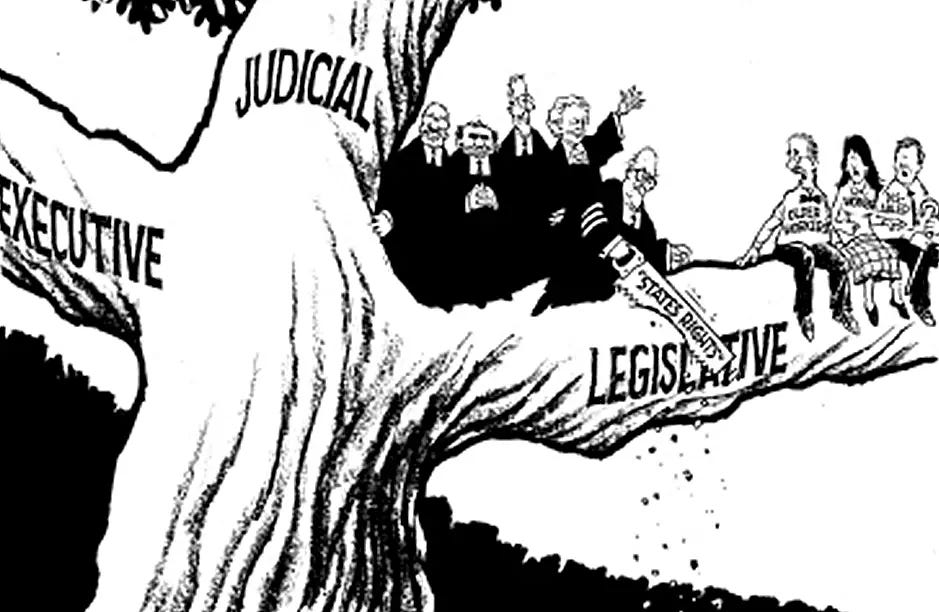


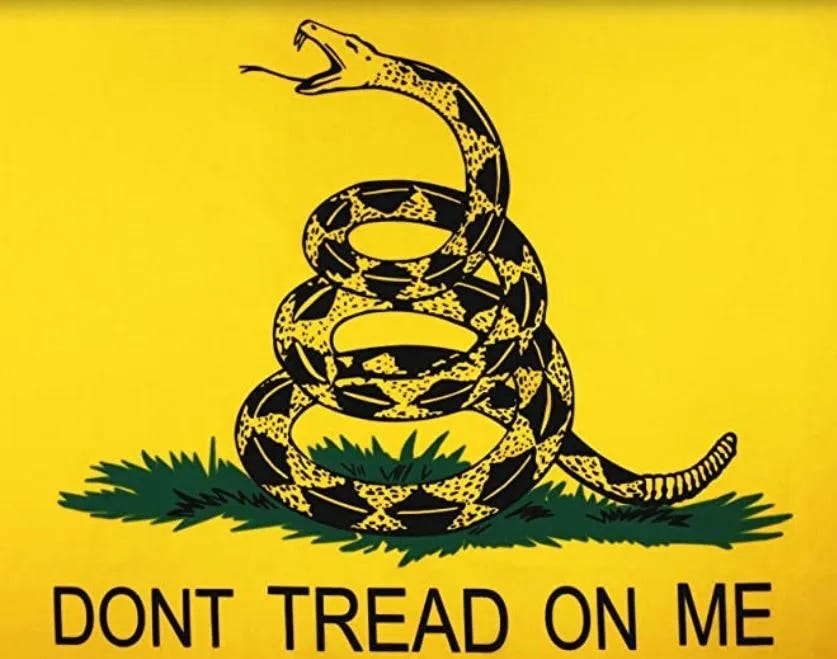
Excellent essay Frederick! We once had giants for leaders. How pathetic we have become!
Religion, especially Christianity molded the American experiment. However, the First Amendment protects freedom of religion. Even though many of the founding fathers had a Christian belief or a foundational understanding of Christianity, didn’t they realize that over time, and through the First Amendment more and more people from other cultures would expand in the United States bringing a growth in religions other than Christianity? I have always wondered about this.